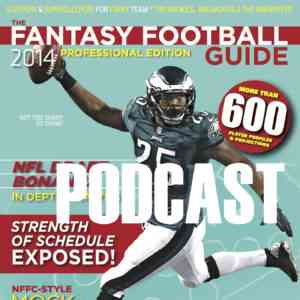On page 2, in the credits for the Position Pages, Marc Meltzer’s name is spelled incorrectly. Sorry Marc.
On page 73-75: STRENGTH OF SCHEDULE
The lists of teams with the easiest schedules are wrong. Here is the correct info (and sorry for missing this):
RUNNERS AGAINST DEFENSES
Easiest Schedules:
Chicago, Tennessee, Denver, Pittsburgh, and Baltimore
Easiest Playoffs:
Oakland, Tampa Bay, Minnesota, Detroit, and Buffalo
Hardest Schedules:
New England, Indianapolis, Miami, San Francisco, and New Orleans
Hardest Playoffs:
New England, Seattle, Cincinnati, Green Bay, and Miami
PASSERS/RECEIVERS AGAINST DEFENSES
Easiest Schedules:
Baltimore, Dallas, Kansas City, Cleveland, and Cincinnati
Easiest Playoffs:
Buffalo, Tampa Bay, Oakland, San Diego, and New York Giants
Hardest Schedules:
New England, Philadelphia, New York Jets, Buffalo, and Indianapolis
Hardest Playoffs:
Seattle, Denver, Indianapolis, Tennessee, and New England
DEFENSES AGAINST OFFENSES
Easiest Schedules:
Indinapolis, Jacksonville, Tennessee, San Diego, and Green Bay
Easiest Playoffs:
Buffalo, Jacksonville, San Diego, Indianapolis, and San Francisco
Hardest Schedules:
Washington, Cleveland, Atlanta, Pittsburgh, and Philadelphia
Hardest Playoffs:
Tampa Bay, Minnesota, Arizona, Baltimore, and Oakland






